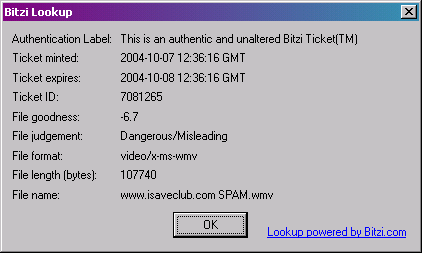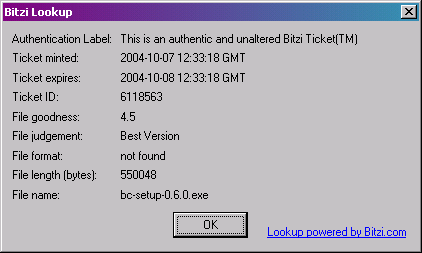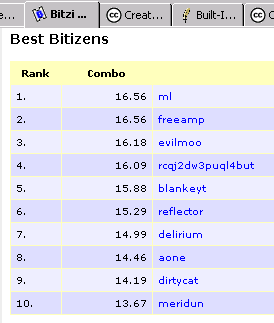Morpheus, a popular filesharing client at version 4.5:
Includes free Bitzi anti-spoofing look-ups to download only the files you want.
That’s an accurate description (and has been true since at least Morpheus 4.1.1). If you see something you’re interested in downloading in search results, you’re a right-click away from a Bitzi lookup. If Bitzi users have judged the file to be spam, virus-laden, or corrupted, you’ll get a response similar to this:

Thirty Bitzi users have judged this file as dangerous or misleading (one bozo recommended the file). A few of the judgement notes tell the story:
Every time I write something,it will come up in my searching files. The size is 105,2 kb every time.
and
stupid isaveclub.com spam, coming from 69.44.152.159:255….discuises itself under many wma files
If Bitzi users have judged the file you’re interested in to be worthy, you’d see something similar to this:

That file happens to be the current release for Windows of Bitzi’s bitcollider file metadata collection tool.
Derek Slater notes that Bitzi metadata is itself subject to spoofing, and
even if Bitzi helps people sort out spoofs, the technological arms race will continue.
Very true. Bitzi is dependent upon community policing, and a concerted effort to create dangerous files and submit fraudulent judgements to Bitzi would work, at least for awhile. There are steps Bitzi can take to militate against such attacks should they become a problem. Unfortunately, as I noted recently, development proceeds at a bear in winter’s pace.
It should also be noted that Morpheus is just one of several applications that enable Bitzi lookups or submissions, though most of these send users to a Bitzi web page rather than integrating raw data from Bitzi lookups into their user interface as Morpheus has (see screenshots above).
